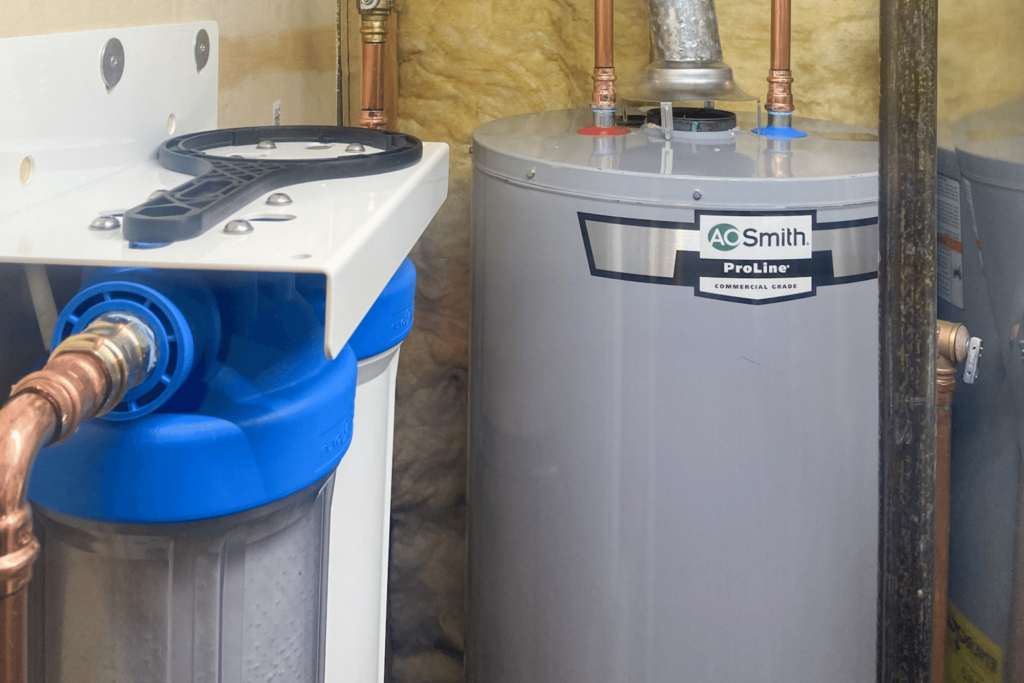“Hard water” can almost be considered a buzzword throughout the plumbing world. Particularly in geographic areas that experience above average levels of hard water, it can be a term that we consistently hear tossed around. Keep in mind that Kansas City is in fact one of those areas dealing with higher levels of hard water. However, beyond it being a term getting mentioned from time-to-time, how does it actually affect Kansas City homeowners? While it is safe to drink and wash with, that doesn’t mean there are no downsides to it. Clothes fading quicker, dryer skin/hair, cloudiness look on dishes after washing, the list goes on. While none of these are major inconveniences, they can be annoying to deal with.
Now, on to the second half of this week’s blog post: water heaters. It’s no surprise that water heaters are a critical component to any home’s plumbing system. After all, I think we could all agree that we enjoy having hot water whenever we hop in the shower or turn on a faucet. Having said that, this week on the blog, we’re going to be taking a look at the impact hard water has on your home’s water heater. Considering a new water heater is a decent-sized investment, it’s always a smart move to try and get the most years out of that investment. Likewise, hard water is also something inevitable that we deal with here in Kansas City, so it’s important to understand how the two are connected and whether or not you should be doing anything as a homeowner.
What is hard water?
We briefly touched on some of the negative factors associated with hard water above. Nonetheless, it’s important to know what exactly hard water is in the first place. For the most part, hard water is created when there are greater concentrations of certain minerals, typically calcium and magnesium. Simply put, when there’s more of these minerals present in the water, the harder it gets. While you can definitely get a little more scientific with the definition of hard water, that is essentially what it is.
How does hard water impact one’s water heater?
So…the question now becomes: how do these increased amounts of calcium and magnesium affect your water heater? Well, believe it or not, the answer is actually rather straightforward. To sum it up, when hard water is present, it can leave behind limescale deposits or mineral sediment. This is like that chalky substance you may see from time-to-time on one of your fixtures. When this happens, the mineral sediment tends to build up at the bottom of your water heater tank and is capable of making it much tougher for your water heater to perform its normal duties.
A perfect way to get a view of what’s going on is to consider the anatomy of your water heater. For the sake of simplicity, we’ll analyze a gas water heater. Towards the bottom of a gas-powered water heater, there’s a number of different components (both inside the tank and outside it). This includes items like your pilot light, drain valve, thermostat control and yes, the actual burner too. With the burner being on the inside and at the bottom of the tank, can you guess what happens when mineral sediment and limescale starts to also accumulate at the bottom? Your burners have to work much harder to heat the water and as a result, this increased wear and tear will cause your water heater to deteriorate quicker than expected.
What’s one water heater maintenance tactic everyone should implement?
We’ve said it before, but regular maintenance is always something homeowners should consider when managing their plumbing system. It goes without saying that larger plumbing repairs or replacements can be expensive to deal with. There are plenty of examples of worthwhile maintenance tasks to complete throughout the year. And truth be told, most of them don’t take all that much time or effort to knock out. Take the sump pump, for example. Generally speaking, you’ll want to provide a quick inspection, make sure the discharge pipe is clear, check if the pump is standing up correctly, remove any debris from the pit and so on. Then, you’ll test it out to ensure it’s ready to go for the next rainy season.
This same level of simplicity applies to the water heater too. Even though there are more technical elements to it and chances are there could be instances where you’ll still need to call a plumber (such as if the expansion tank were to experience issues), there is one task that every homeowner should complete at least once a year. Given that a major focus on this blog has been the adverse effects of hard water, you can probably guess that it’s going to be related to that frustrating mineral sediment building up at the bottom of your tank. This annual task is what we like to call a water heater flush. Flushing your water heater is simply designed to drive out that sediment buildup from the tank to prevent it from wreaking havoc on your unit. Keep in mind that the “one flush a year” is simply a general number we tend to recommend. There are a few other factors that can come into play, including the actual hardness of your water. For areas with significantly higher levels of hard water, you may find yourself flushing the heater more frequently.
Have a tankless water heater? While tankless water heaters have gradually become more and more popular, they also need to be flushed as well. We’ve discussed the advantages provided by tankless water heaters, as well as why so many of our customers have been loving their tankless units. Click HERE to check out our blog post from earlier this year to learn more about tankless water heaters.
Water Softener and Water Heater Services in Kansas City
Being a residential and commercial plumbing company, it’s safe to say that you need a wide range of service offerings. Just think about the different components of a household plumbing system. Sump pumps, water heaters, faucets, toilets, showers, freestanding tubs, sewer lines, water softeners, you name it! And as evidenced throughout this blog, we can confidently say that water heaters and water softeners continue to be among the more popular calls we receive each and every week.
We hope you found some valuable information in this blog detailing the relation of hard water to water heaters. While there’s nothing you can do to avoid the presence of hard water (particularly in areas like Kansas City), there are definitely things you can do to limit the potential downsides it can cause on your plumbing system. We broke down the importance of performing an annual water heater flush above, but another possibility worth considering is having a water softener installed. A water softener system is designed to minimize the adverse effects of hard water, by taking care of those increased amounts of calcium and magnesium. With this, you have the option of going with a salt-based softener or an alternative solution (such as NuvoH2O’s citrus-based units). We actually dove deeper into the NuvoH2O systems just a couple of weeks ago here on the blog. Click HERE if you would like to read that blog post. For those that are interested in learning more about either our water heater or water softener services, don’t hesitate to fill out the form HERE.


